Leadership and Motivation: NUMMI Case Study (OB Assignment 1)
VerifiedAdded on 2020/10/04
|9
|3228
|36
Essay
AI Summary
This essay analyzes the organizational behavior of New United Motor Manufacturing, Inc (NUMMI), focusing on its approach to employee motivation and its alignment with Maslow's hierarchy of needs, Herzberg's two-factor theory, and the Job Characteristics Model. The essay examines how NUMMI's practices, such as delegating authority, ensuring job security, and promoting employee involvement, satisfy employees' needs and contribute to a positive work environment. It explores the implications of these practices, including the empowerment of workers and the potential for conflicts. The essay also provides recommendations on what NUMMI should continue doing, what it should start doing, and how it can improve its practices to further enhance employee satisfaction, productivity, and overall organizational success. The analysis covers factors such as job allocation, training, and the balance of authority between workers and managers, considering the impact of these elements on employee morale and productivity.
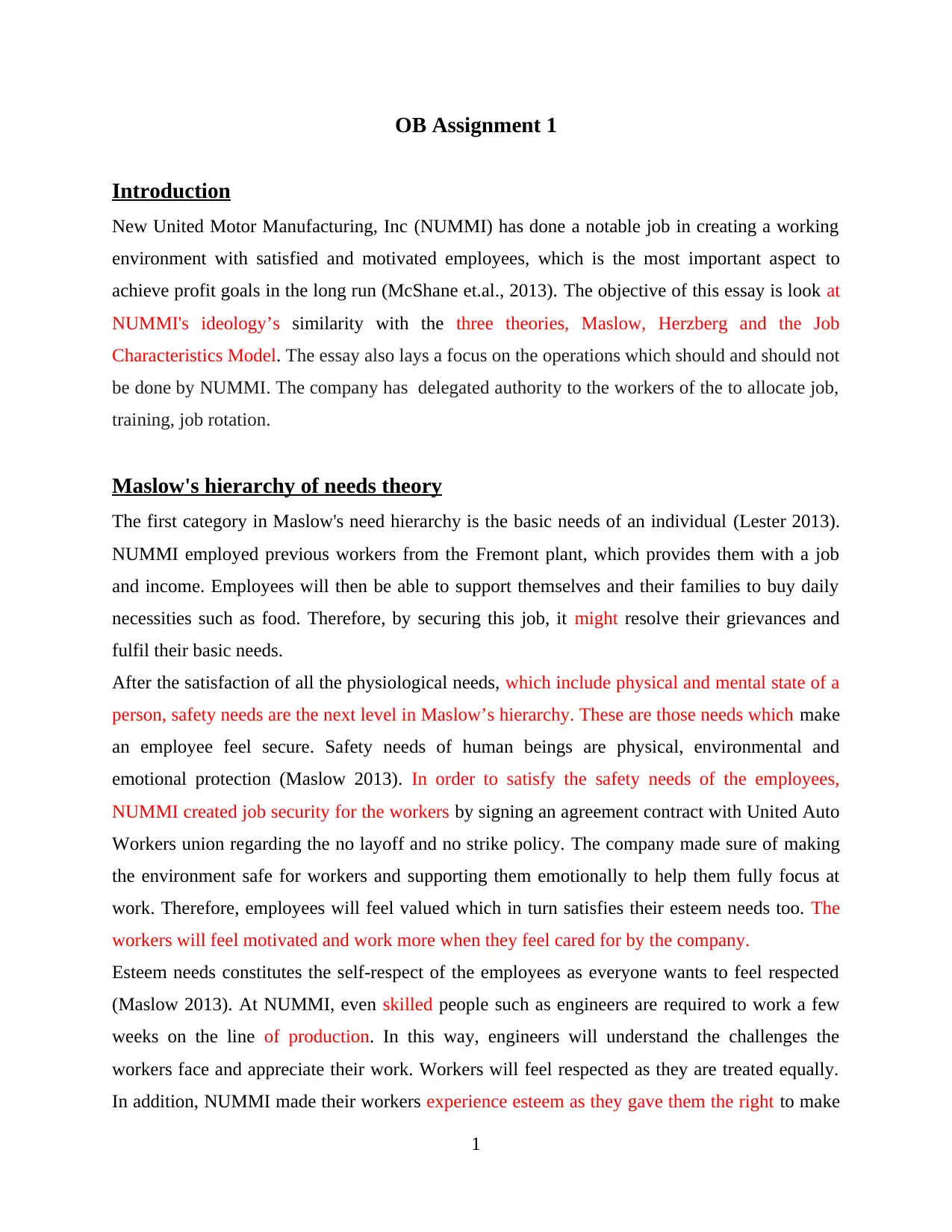
OB Assignment 1
Introduction
New United Motor Manufacturing, Inc (NUMMI) has done a notable job in creating a working
environment with satisfied and motivated employees, which is the most important aspect to
achieve profit goals in the long run (McShane et.al., 2013). The objective of this essay is look at
NUMMI's ideology’s similarity with the three theories, Maslow, Herzberg and the Job
Characteristics Model. The essay also lays a focus on the operations which should and should not
be done by NUMMI. The company has delegated authority to the workers of the to allocate job,
training, job rotation.
Maslow's hierarchy of needs theory
The first category in Maslow's need hierarchy is the basic needs of an individual (Lester 2013).
NUMMI employed previous workers from the Fremont plant, which provides them with a job
and income. Employees will then be able to support themselves and their families to buy daily
necessities such as food. Therefore, by securing this job, it might resolve their grievances and
fulfil their basic needs.
After the satisfaction of all the physiological needs, which include physical and mental state of a
person, safety needs are the next level in Maslow’s hierarchy. These are those needs which make
an employee feel secure. Safety needs of human beings are physical, environmental and
emotional protection (Maslow 2013). In order to satisfy the safety needs of the employees,
NUMMI created job security for the workers by signing an agreement contract with United Auto
Workers union regarding the no layoff and no strike policy. The company made sure of making
the environment safe for workers and supporting them emotionally to help them fully focus at
work. Therefore, employees will feel valued which in turn satisfies their esteem needs too. The
workers will feel motivated and work more when they feel cared for by the company.
Esteem needs constitutes the self-respect of the employees as everyone wants to feel respected
(Maslow 2013). At NUMMI, even skilled people such as engineers are required to work a few
weeks on the line of production. In this way, engineers will understand the challenges the
workers face and appreciate their work. Workers will feel respected as they are treated equally.
In addition, NUMMI made their workers experience esteem as they gave them the right to make
1
Introduction
New United Motor Manufacturing, Inc (NUMMI) has done a notable job in creating a working
environment with satisfied and motivated employees, which is the most important aspect to
achieve profit goals in the long run (McShane et.al., 2013). The objective of this essay is look at
NUMMI's ideology’s similarity with the three theories, Maslow, Herzberg and the Job
Characteristics Model. The essay also lays a focus on the operations which should and should not
be done by NUMMI. The company has delegated authority to the workers of the to allocate job,
training, job rotation.
Maslow's hierarchy of needs theory
The first category in Maslow's need hierarchy is the basic needs of an individual (Lester 2013).
NUMMI employed previous workers from the Fremont plant, which provides them with a job
and income. Employees will then be able to support themselves and their families to buy daily
necessities such as food. Therefore, by securing this job, it might resolve their grievances and
fulfil their basic needs.
After the satisfaction of all the physiological needs, which include physical and mental state of a
person, safety needs are the next level in Maslow’s hierarchy. These are those needs which make
an employee feel secure. Safety needs of human beings are physical, environmental and
emotional protection (Maslow 2013). In order to satisfy the safety needs of the employees,
NUMMI created job security for the workers by signing an agreement contract with United Auto
Workers union regarding the no layoff and no strike policy. The company made sure of making
the environment safe for workers and supporting them emotionally to help them fully focus at
work. Therefore, employees will feel valued which in turn satisfies their esteem needs too. The
workers will feel motivated and work more when they feel cared for by the company.
Esteem needs constitutes the self-respect of the employees as everyone wants to feel respected
(Maslow 2013). At NUMMI, even skilled people such as engineers are required to work a few
weeks on the line of production. In this way, engineers will understand the challenges the
workers face and appreciate their work. Workers will feel respected as they are treated equally.
In addition, NUMMI made their workers experience esteem as they gave them the right to make
1
Paraphrase This Document
Need a fresh take? Get an instant paraphrase of this document with our AI Paraphraser
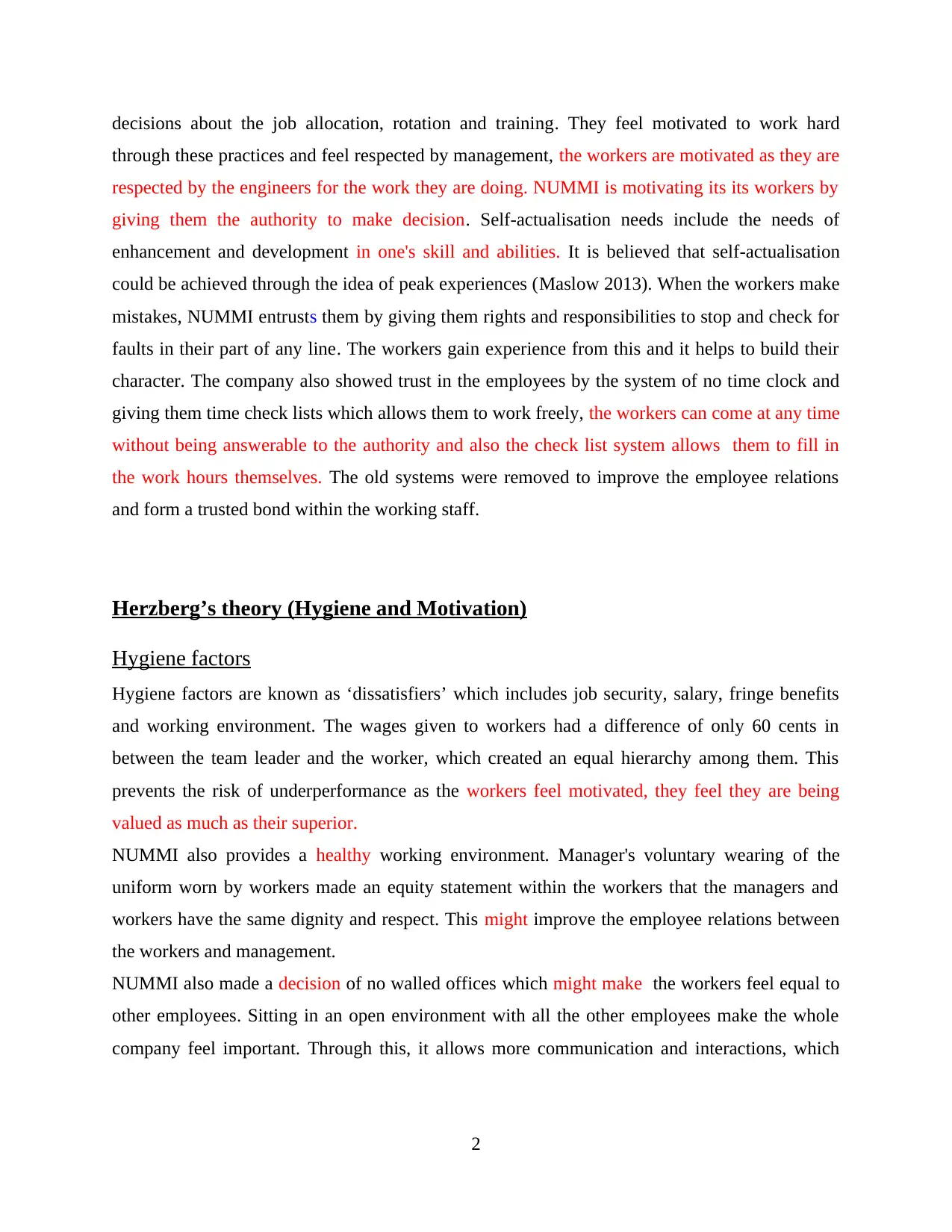
decisions about the job allocation, rotation and training. They feel motivated to work hard
through these practices and feel respected by management, the workers are motivated as they are
respected by the engineers for the work they are doing. NUMMI is motivating its its workers by
giving them the authority to make decision. Self-actualisation needs include the needs of
enhancement and development in one's skill and abilities. It is believed that self-actualisation
could be achieved through the idea of peak experiences (Maslow 2013). When the workers make
mistakes, NUMMI entrusts them by giving them rights and responsibilities to stop and check for
faults in their part of any line. The workers gain experience from this and it helps to build their
character. The company also showed trust in the employees by the system of no time clock and
giving them time check lists which allows them to work freely, the workers can come at any time
without being answerable to the authority and also the check list system allows them to fill in
the work hours themselves. The old systems were removed to improve the employee relations
and form a trusted bond within the working staff.
Herzberg’s theory (Hygiene and Motivation)
Hygiene factors
Hygiene factors are known as ‘dissatisfiers’ which includes job security, salary, fringe benefits
and working environment. The wages given to workers had a difference of only 60 cents in
between the team leader and the worker, which created an equal hierarchy among them. This
prevents the risk of underperformance as the workers feel motivated, they feel they are being
valued as much as their superior.
NUMMI also provides a healthy working environment. Manager's voluntary wearing of the
uniform worn by workers made an equity statement within the workers that the managers and
workers have the same dignity and respect. This might improve the employee relations between
the workers and management.
NUMMI also made a decision of no walled offices which might make the workers feel equal to
other employees. Sitting in an open environment with all the other employees make the whole
company feel important. Through this, it allows more communication and interactions, which
2
through these practices and feel respected by management, the workers are motivated as they are
respected by the engineers for the work they are doing. NUMMI is motivating its its workers by
giving them the authority to make decision. Self-actualisation needs include the needs of
enhancement and development in one's skill and abilities. It is believed that self-actualisation
could be achieved through the idea of peak experiences (Maslow 2013). When the workers make
mistakes, NUMMI entrusts them by giving them rights and responsibilities to stop and check for
faults in their part of any line. The workers gain experience from this and it helps to build their
character. The company also showed trust in the employees by the system of no time clock and
giving them time check lists which allows them to work freely, the workers can come at any time
without being answerable to the authority and also the check list system allows them to fill in
the work hours themselves. The old systems were removed to improve the employee relations
and form a trusted bond within the working staff.
Herzberg’s theory (Hygiene and Motivation)
Hygiene factors
Hygiene factors are known as ‘dissatisfiers’ which includes job security, salary, fringe benefits
and working environment. The wages given to workers had a difference of only 60 cents in
between the team leader and the worker, which created an equal hierarchy among them. This
prevents the risk of underperformance as the workers feel motivated, they feel they are being
valued as much as their superior.
NUMMI also provides a healthy working environment. Manager's voluntary wearing of the
uniform worn by workers made an equity statement within the workers that the managers and
workers have the same dignity and respect. This might improve the employee relations between
the workers and management.
NUMMI also made a decision of no walled offices which might make the workers feel equal to
other employees. Sitting in an open environment with all the other employees make the whole
company feel important. Through this, it allows more communication and interactions, which
2
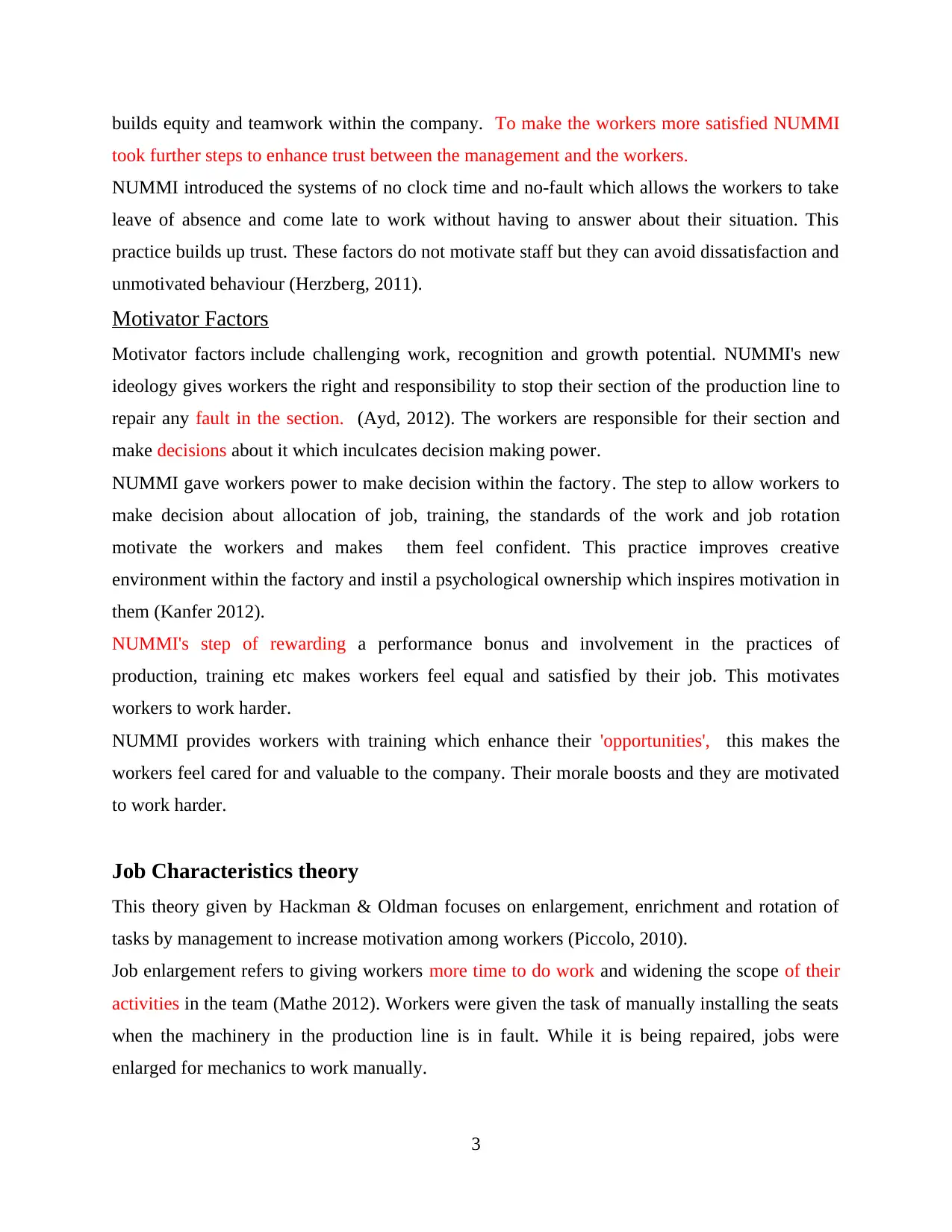
builds equity and teamwork within the company. To make the workers more satisfied NUMMI
took further steps to enhance trust between the management and the workers.
NUMMI introduced the systems of no clock time and no-fault which allows the workers to take
leave of absence and come late to work without having to answer about their situation. This
practice builds up trust. These factors do not motivate staff but they can avoid dissatisfaction and
unmotivated behaviour (Herzberg, 2011).
Motivator Factors
Motivator factors include challenging work, recognition and growth potential. NUMMI's new
ideology gives workers the right and responsibility to stop their section of the production line to
repair any fault in the section. (Ayd, 2012). The workers are responsible for their section and
make decisions about it which inculcates decision making power.
NUMMI gave workers power to make decision within the factory. The step to allow workers to
make decision about allocation of job, training, the standards of the work and job rotation
motivate the workers and makes them feel confident. This practice improves creative
environment within the factory and instil a psychological ownership which inspires motivation in
them (Kanfer 2012).
NUMMI's step of rewarding a performance bonus and involvement in the practices of
production, training etc makes workers feel equal and satisfied by their job. This motivates
workers to work harder.
NUMMI provides workers with training which enhance their 'opportunities', this makes the
workers feel cared for and valuable to the company. Their morale boosts and they are motivated
to work harder.
Job Characteristics theory
This theory given by Hackman & Oldman focuses on enlargement, enrichment and rotation of
tasks by management to increase motivation among workers (Piccolo, 2010).
Job enlargement refers to giving workers more time to do work and widening the scope of their
activities in the team (Mathe 2012). Workers were given the task of manually installing the seats
when the machinery in the production line is in fault. While it is being repaired, jobs were
enlarged for mechanics to work manually.
3
took further steps to enhance trust between the management and the workers.
NUMMI introduced the systems of no clock time and no-fault which allows the workers to take
leave of absence and come late to work without having to answer about their situation. This
practice builds up trust. These factors do not motivate staff but they can avoid dissatisfaction and
unmotivated behaviour (Herzberg, 2011).
Motivator Factors
Motivator factors include challenging work, recognition and growth potential. NUMMI's new
ideology gives workers the right and responsibility to stop their section of the production line to
repair any fault in the section. (Ayd, 2012). The workers are responsible for their section and
make decisions about it which inculcates decision making power.
NUMMI gave workers power to make decision within the factory. The step to allow workers to
make decision about allocation of job, training, the standards of the work and job rotation
motivate the workers and makes them feel confident. This practice improves creative
environment within the factory and instil a psychological ownership which inspires motivation in
them (Kanfer 2012).
NUMMI's step of rewarding a performance bonus and involvement in the practices of
production, training etc makes workers feel equal and satisfied by their job. This motivates
workers to work harder.
NUMMI provides workers with training which enhance their 'opportunities', this makes the
workers feel cared for and valuable to the company. Their morale boosts and they are motivated
to work harder.
Job Characteristics theory
This theory given by Hackman & Oldman focuses on enlargement, enrichment and rotation of
tasks by management to increase motivation among workers (Piccolo, 2010).
Job enlargement refers to giving workers more time to do work and widening the scope of their
activities in the team (Mathe 2012). Workers were given the task of manually installing the seats
when the machinery in the production line is in fault. While it is being repaired, jobs were
enlarged for mechanics to work manually.
3
⊘ This is a preview!⊘
Do you want full access?
Subscribe today to unlock all pages.

Trusted by 1+ million students worldwide
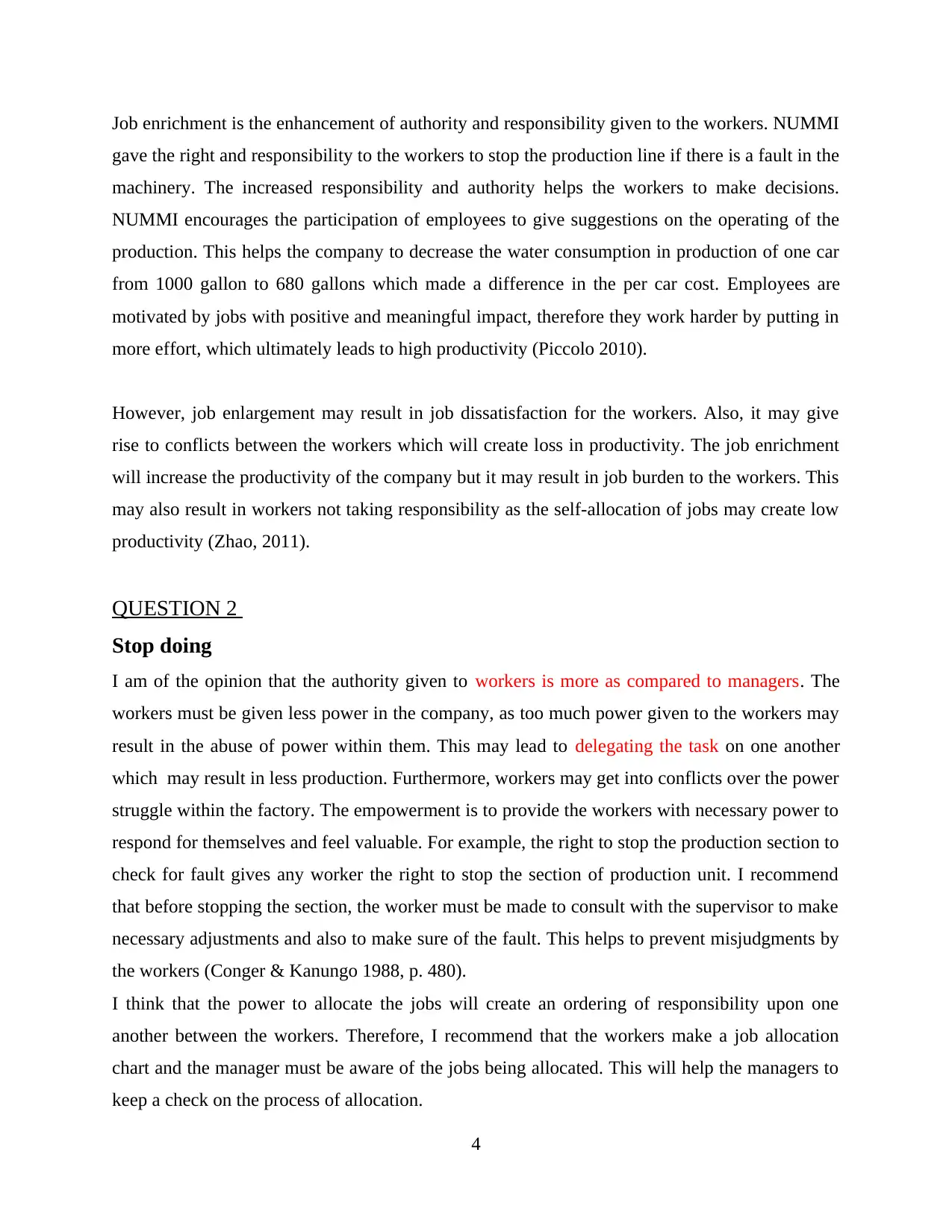
Job enrichment is the enhancement of authority and responsibility given to the workers. NUMMI
gave the right and responsibility to the workers to stop the production line if there is a fault in the
machinery. The increased responsibility and authority helps the workers to make decisions.
NUMMI encourages the participation of employees to give suggestions on the operating of the
production. This helps the company to decrease the water consumption in production of one car
from 1000 gallon to 680 gallons which made a difference in the per car cost. Employees are
motivated by jobs with positive and meaningful impact, therefore they work harder by putting in
more effort, which ultimately leads to high productivity (Piccolo 2010).
However, job enlargement may result in job dissatisfaction for the workers. Also, it may give
rise to conflicts between the workers which will create loss in productivity. The job enrichment
will increase the productivity of the company but it may result in job burden to the workers. This
may also result in workers not taking responsibility as the self-allocation of jobs may create low
productivity (Zhao, 2011).
QUESTION 2
Stop doing
I am of the opinion that the authority given to workers is more as compared to managers. The
workers must be given less power in the company, as too much power given to the workers may
result in the abuse of power within them. This may lead to delegating the task on one another
which may result in less production. Furthermore, workers may get into conflicts over the power
struggle within the factory. The empowerment is to provide the workers with necessary power to
respond for themselves and feel valuable. For example, the right to stop the production section to
check for fault gives any worker the right to stop the section of production unit. I recommend
that before stopping the section, the worker must be made to consult with the supervisor to make
necessary adjustments and also to make sure of the fault. This helps to prevent misjudgments by
the workers (Conger & Kanungo 1988, p. 480).
I think that the power to allocate the jobs will create an ordering of responsibility upon one
another between the workers. Therefore, I recommend that the workers make a job allocation
chart and the manager must be aware of the jobs being allocated. This will help the managers to
keep a check on the process of allocation.
4
gave the right and responsibility to the workers to stop the production line if there is a fault in the
machinery. The increased responsibility and authority helps the workers to make decisions.
NUMMI encourages the participation of employees to give suggestions on the operating of the
production. This helps the company to decrease the water consumption in production of one car
from 1000 gallon to 680 gallons which made a difference in the per car cost. Employees are
motivated by jobs with positive and meaningful impact, therefore they work harder by putting in
more effort, which ultimately leads to high productivity (Piccolo 2010).
However, job enlargement may result in job dissatisfaction for the workers. Also, it may give
rise to conflicts between the workers which will create loss in productivity. The job enrichment
will increase the productivity of the company but it may result in job burden to the workers. This
may also result in workers not taking responsibility as the self-allocation of jobs may create low
productivity (Zhao, 2011).
QUESTION 2
Stop doing
I am of the opinion that the authority given to workers is more as compared to managers. The
workers must be given less power in the company, as too much power given to the workers may
result in the abuse of power within them. This may lead to delegating the task on one another
which may result in less production. Furthermore, workers may get into conflicts over the power
struggle within the factory. The empowerment is to provide the workers with necessary power to
respond for themselves and feel valuable. For example, the right to stop the production section to
check for fault gives any worker the right to stop the section of production unit. I recommend
that before stopping the section, the worker must be made to consult with the supervisor to make
necessary adjustments and also to make sure of the fault. This helps to prevent misjudgments by
the workers (Conger & Kanungo 1988, p. 480).
I think that the power to allocate the jobs will create an ordering of responsibility upon one
another between the workers. Therefore, I recommend that the workers make a job allocation
chart and the manager must be aware of the jobs being allocated. This will help the managers to
keep a check on the process of allocation.
4
Paraphrase This Document
Need a fresh take? Get an instant paraphrase of this document with our AI Paraphraser
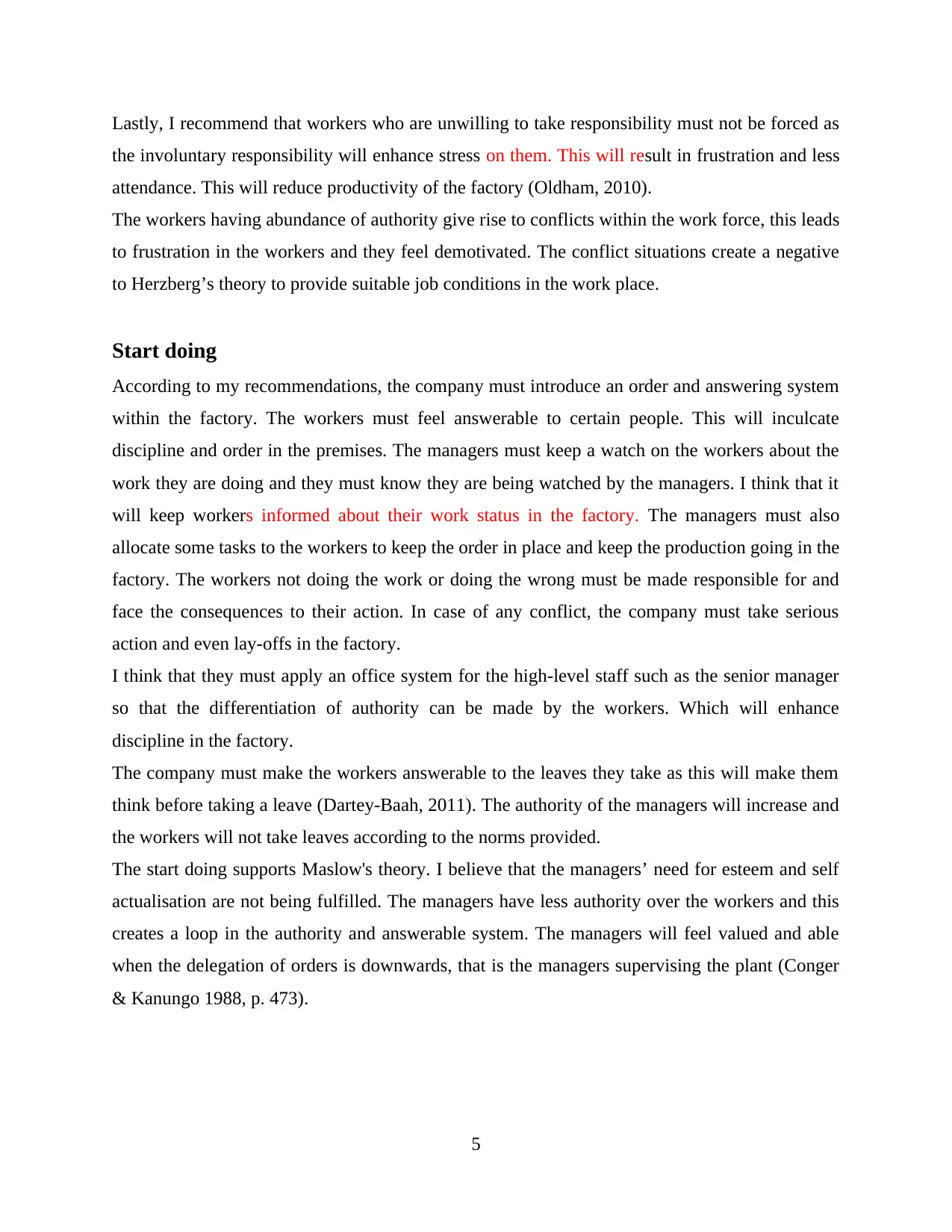
Lastly, I recommend that workers who are unwilling to take responsibility must not be forced as
the involuntary responsibility will enhance stress on them. This will result in frustration and less
attendance. This will reduce productivity of the factory (Oldham, 2010).
The workers having abundance of authority give rise to conflicts within the work force, this leads
to frustration in the workers and they feel demotivated. The conflict situations create a negative
to Herzberg’s theory to provide suitable job conditions in the work place.
Start doing
According to my recommendations, the company must introduce an order and answering system
within the factory. The workers must feel answerable to certain people. This will inculcate
discipline and order in the premises. The managers must keep a watch on the workers about the
work they are doing and they must know they are being watched by the managers. I think that it
will keep workers informed about their work status in the factory. The managers must also
allocate some tasks to the workers to keep the order in place and keep the production going in the
factory. The workers not doing the work or doing the wrong must be made responsible for and
face the consequences to their action. In case of any conflict, the company must take serious
action and even lay-offs in the factory.
I think that they must apply an office system for the high-level staff such as the senior manager
so that the differentiation of authority can be made by the workers. Which will enhance
discipline in the factory.
The company must make the workers answerable to the leaves they take as this will make them
think before taking a leave (Dartey-Baah, 2011). The authority of the managers will increase and
the workers will not take leaves according to the norms provided.
The start doing supports Maslow's theory. I believe that the managers’ need for esteem and self
actualisation are not being fulfilled. The managers have less authority over the workers and this
creates a loop in the authority and answerable system. The managers will feel valued and able
when the delegation of orders is downwards, that is the managers supervising the plant (Conger
& Kanungo 1988, p. 473).
5
the involuntary responsibility will enhance stress on them. This will result in frustration and less
attendance. This will reduce productivity of the factory (Oldham, 2010).
The workers having abundance of authority give rise to conflicts within the work force, this leads
to frustration in the workers and they feel demotivated. The conflict situations create a negative
to Herzberg’s theory to provide suitable job conditions in the work place.
Start doing
According to my recommendations, the company must introduce an order and answering system
within the factory. The workers must feel answerable to certain people. This will inculcate
discipline and order in the premises. The managers must keep a watch on the workers about the
work they are doing and they must know they are being watched by the managers. I think that it
will keep workers informed about their work status in the factory. The managers must also
allocate some tasks to the workers to keep the order in place and keep the production going in the
factory. The workers not doing the work or doing the wrong must be made responsible for and
face the consequences to their action. In case of any conflict, the company must take serious
action and even lay-offs in the factory.
I think that they must apply an office system for the high-level staff such as the senior manager
so that the differentiation of authority can be made by the workers. Which will enhance
discipline in the factory.
The company must make the workers answerable to the leaves they take as this will make them
think before taking a leave (Dartey-Baah, 2011). The authority of the managers will increase and
the workers will not take leaves according to the norms provided.
The start doing supports Maslow's theory. I believe that the managers’ need for esteem and self
actualisation are not being fulfilled. The managers have less authority over the workers and this
creates a loop in the authority and answerable system. The managers will feel valued and able
when the delegation of orders is downwards, that is the managers supervising the plant (Conger
& Kanungo 1988, p. 473).
5
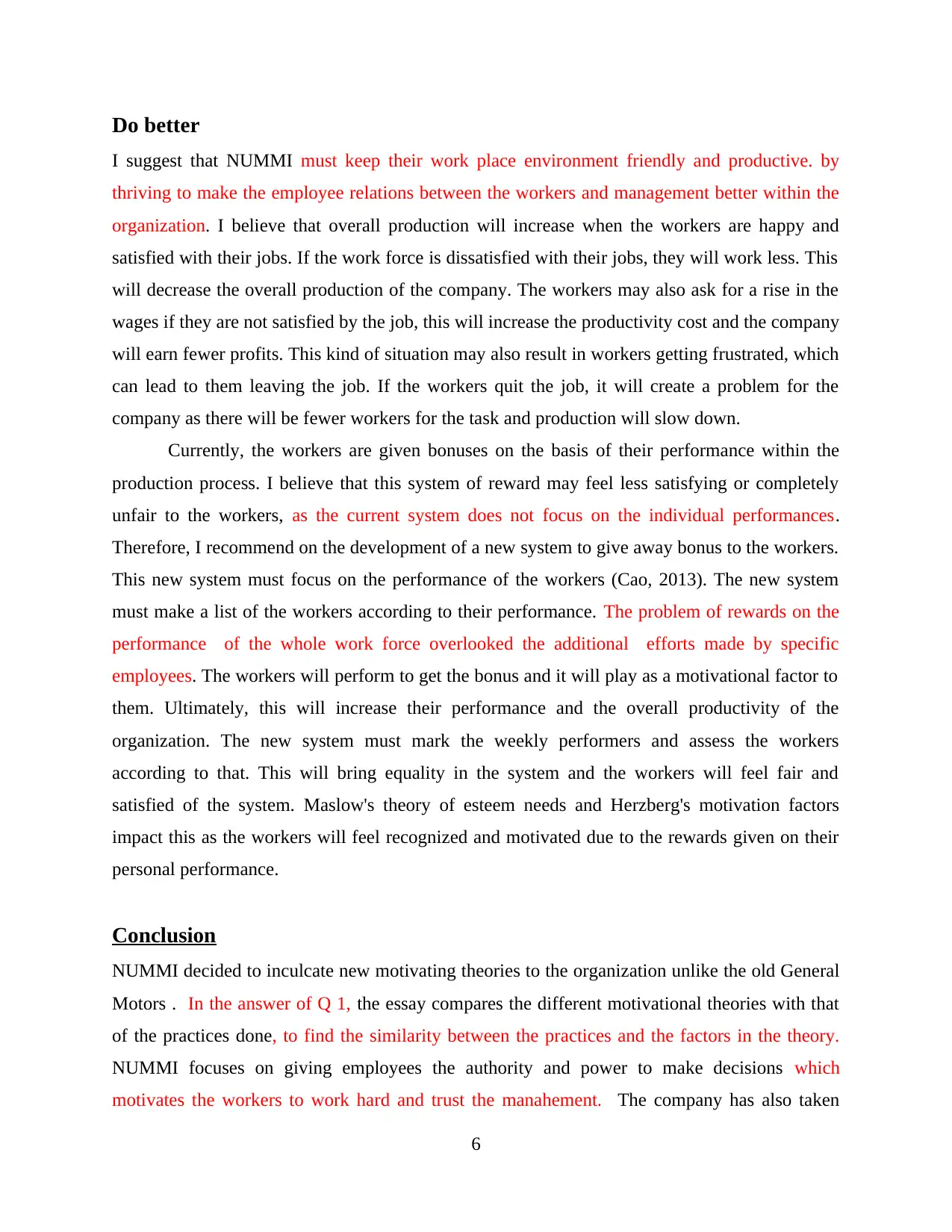
Do better
I suggest that NUMMI must keep their work place environment friendly and productive. by
thriving to make the employee relations between the workers and management better within the
organization. I believe that overall production will increase when the workers are happy and
satisfied with their jobs. If the work force is dissatisfied with their jobs, they will work less. This
will decrease the overall production of the company. The workers may also ask for a rise in the
wages if they are not satisfied by the job, this will increase the productivity cost and the company
will earn fewer profits. This kind of situation may also result in workers getting frustrated, which
can lead to them leaving the job. If the workers quit the job, it will create a problem for the
company as there will be fewer workers for the task and production will slow down.
Currently, the workers are given bonuses on the basis of their performance within the
production process. I believe that this system of reward may feel less satisfying or completely
unfair to the workers, as the current system does not focus on the individual performances.
Therefore, I recommend on the development of a new system to give away bonus to the workers.
This new system must focus on the performance of the workers (Cao, 2013). The new system
must make a list of the workers according to their performance. The problem of rewards on the
performance of the whole work force overlooked the additional efforts made by specific
employees. The workers will perform to get the bonus and it will play as a motivational factor to
them. Ultimately, this will increase their performance and the overall productivity of the
organization. The new system must mark the weekly performers and assess the workers
according to that. This will bring equality in the system and the workers will feel fair and
satisfied of the system. Maslow's theory of esteem needs and Herzberg's motivation factors
impact this as the workers will feel recognized and motivated due to the rewards given on their
personal performance.
Conclusion
NUMMI decided to inculcate new motivating theories to the organization unlike the old General
Motors . In the answer of Q 1, the essay compares the different motivational theories with that
of the practices done, to find the similarity between the practices and the factors in the theory.
NUMMI focuses on giving employees the authority and power to make decisions which
motivates the workers to work hard and trust the manahement. The company has also taken
6
I suggest that NUMMI must keep their work place environment friendly and productive. by
thriving to make the employee relations between the workers and management better within the
organization. I believe that overall production will increase when the workers are happy and
satisfied with their jobs. If the work force is dissatisfied with their jobs, they will work less. This
will decrease the overall production of the company. The workers may also ask for a rise in the
wages if they are not satisfied by the job, this will increase the productivity cost and the company
will earn fewer profits. This kind of situation may also result in workers getting frustrated, which
can lead to them leaving the job. If the workers quit the job, it will create a problem for the
company as there will be fewer workers for the task and production will slow down.
Currently, the workers are given bonuses on the basis of their performance within the
production process. I believe that this system of reward may feel less satisfying or completely
unfair to the workers, as the current system does not focus on the individual performances.
Therefore, I recommend on the development of a new system to give away bonus to the workers.
This new system must focus on the performance of the workers (Cao, 2013). The new system
must make a list of the workers according to their performance. The problem of rewards on the
performance of the whole work force overlooked the additional efforts made by specific
employees. The workers will perform to get the bonus and it will play as a motivational factor to
them. Ultimately, this will increase their performance and the overall productivity of the
organization. The new system must mark the weekly performers and assess the workers
according to that. This will bring equality in the system and the workers will feel fair and
satisfied of the system. Maslow's theory of esteem needs and Herzberg's motivation factors
impact this as the workers will feel recognized and motivated due to the rewards given on their
personal performance.
Conclusion
NUMMI decided to inculcate new motivating theories to the organization unlike the old General
Motors . In the answer of Q 1, the essay compares the different motivational theories with that
of the practices done, to find the similarity between the practices and the factors in the theory.
NUMMI focuses on giving employees the authority and power to make decisions which
motivates the workers to work hard and trust the manahement. The company has also taken
6
⊘ This is a preview!⊘
Do you want full access?
Subscribe today to unlock all pages.

Trusted by 1+ million students worldwide
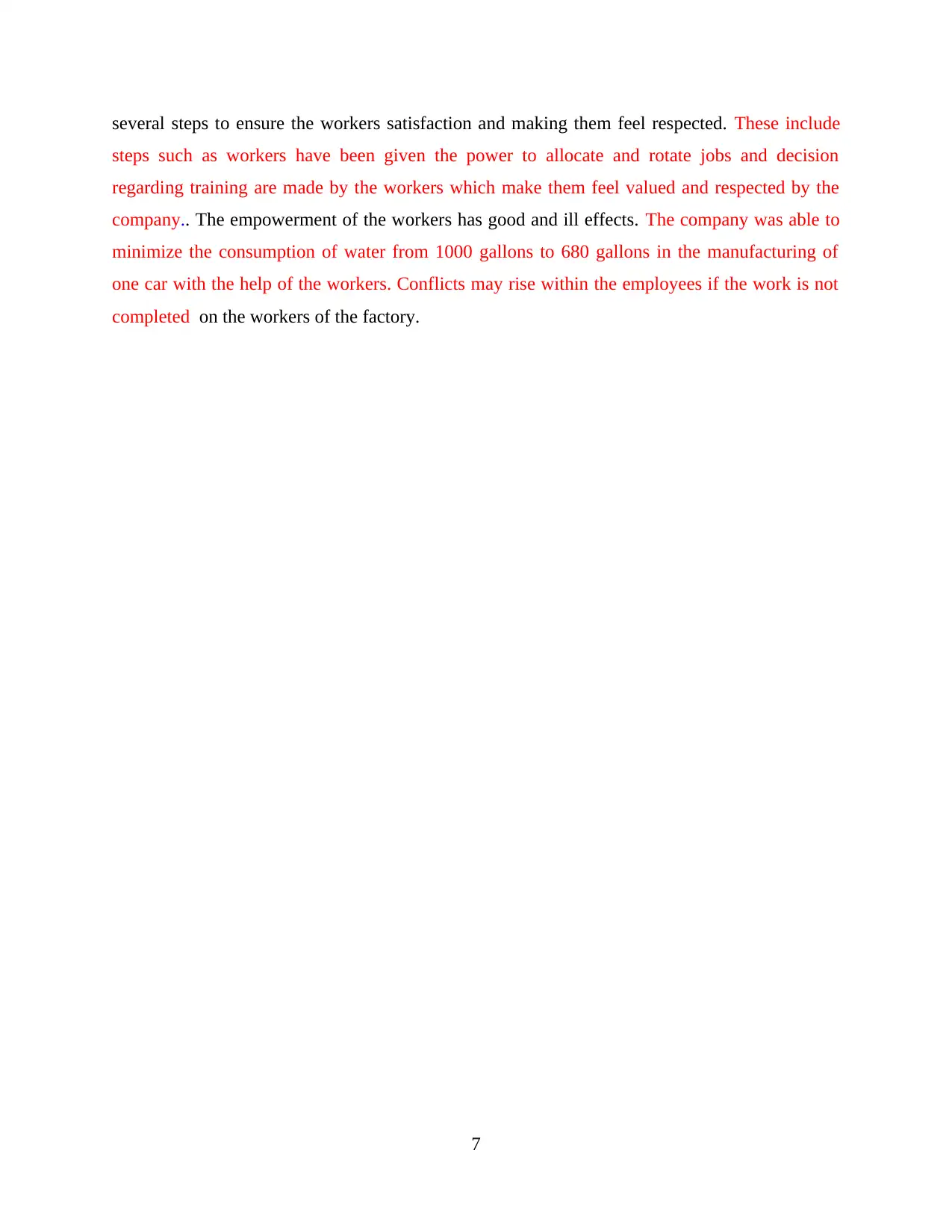
several steps to ensure the workers satisfaction and making them feel respected. These include
steps such as workers have been given the power to allocate and rotate jobs and decision
regarding training are made by the workers which make them feel valued and respected by the
company.. The empowerment of the workers has good and ill effects. The company was able to
minimize the consumption of water from 1000 gallons to 680 gallons in the manufacturing of
one car with the help of the workers. Conflicts may rise within the employees if the work is not
completed on the workers of the factory.
7
steps such as workers have been given the power to allocate and rotate jobs and decision
regarding training are made by the workers which make them feel valued and respected by the
company.. The empowerment of the workers has good and ill effects. The company was able to
minimize the consumption of water from 1000 gallons to 680 gallons in the manufacturing of
one car with the help of the workers. Conflicts may rise within the employees if the work is not
completed on the workers of the factory.
7
Paraphrase This Document
Need a fresh take? Get an instant paraphrase of this document with our AI Paraphraser
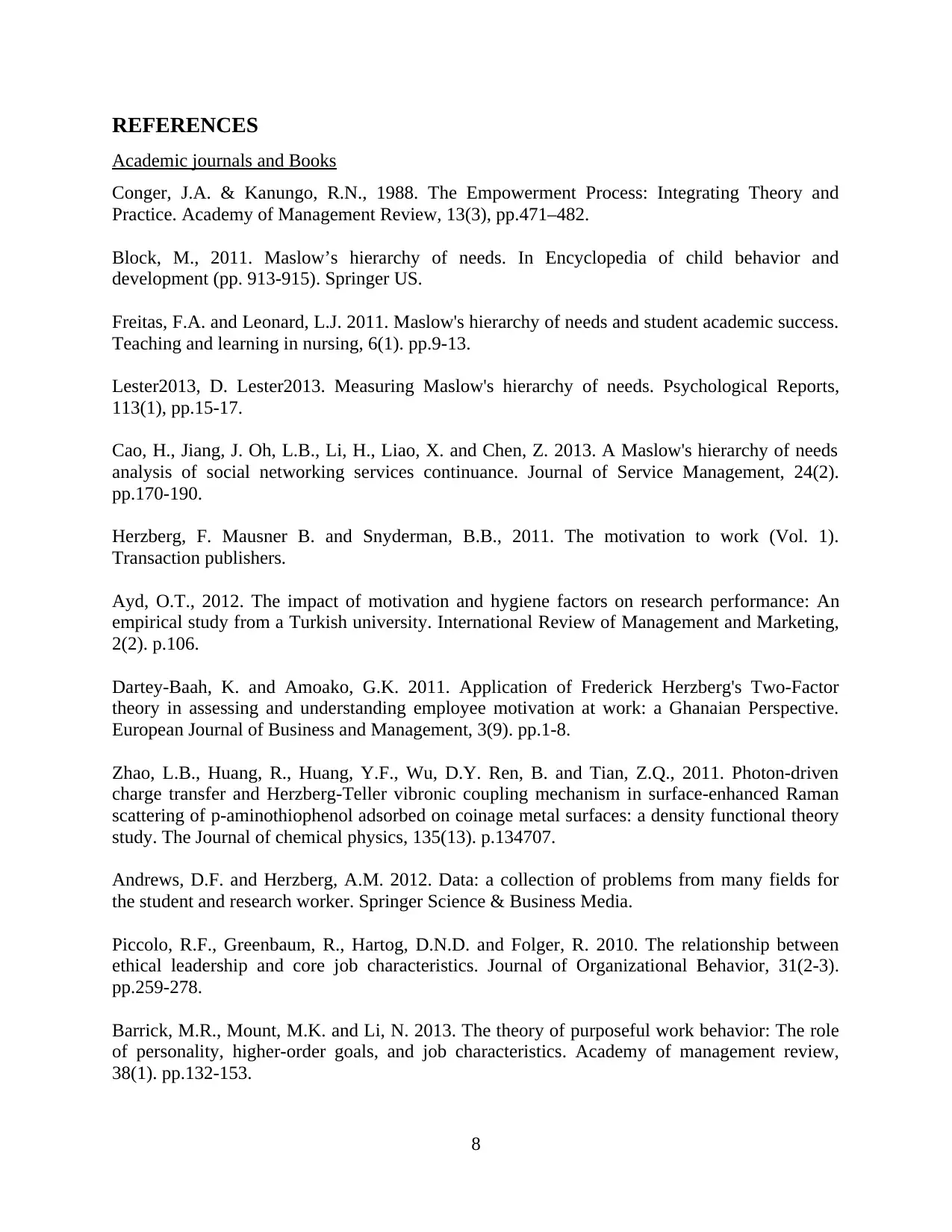
REFERENCES
Academic journals and Books
Conger, J.A. & Kanungo, R.N., 1988. The Empowerment Process: Integrating Theory and
Practice. Academy of Management Review, 13(3), pp.471–482.
Block, M., 2011. Maslow’s hierarchy of needs. In Encyclopedia of child behavior and
development (pp. 913-915). Springer US.
Freitas, F.A. and Leonard, L.J. 2011. Maslow's hierarchy of needs and student academic success.
Teaching and learning in nursing, 6(1). pp.9-13.
Lester2013, D. Lester2013. Measuring Maslow's hierarchy of needs. Psychological Reports,
113(1), pp.15-17.
Cao, H., Jiang, J. Oh, L.B., Li, H., Liao, X. and Chen, Z. 2013. A Maslow's hierarchy of needs
analysis of social networking services continuance. Journal of Service Management, 24(2).
pp.170-190.
Herzberg, F. Mausner B. and Snyderman, B.B., 2011. The motivation to work (Vol. 1).
Transaction publishers.
Ayd, O.T., 2012. The impact of motivation and hygiene factors on research performance: An
empirical study from a Turkish university. International Review of Management and Marketing,
2(2). p.106.
Dartey-Baah, K. and Amoako, G.K. 2011. Application of Frederick Herzberg's Two-Factor
theory in assessing and understanding employee motivation at work: a Ghanaian Perspective.
European Journal of Business and Management, 3(9). pp.1-8.
Zhao, L.B., Huang, R., Huang, Y.F., Wu, D.Y. Ren, B. and Tian, Z.Q., 2011. Photon-driven
charge transfer and Herzberg-Teller vibronic coupling mechanism in surface-enhanced Raman
scattering of p-aminothiophenol adsorbed on coinage metal surfaces: a density functional theory
study. The Journal of chemical physics, 135(13). p.134707.
Andrews, D.F. and Herzberg, A.M. 2012. Data: a collection of problems from many fields for
the student and research worker. Springer Science & Business Media.
Piccolo, R.F., Greenbaum, R., Hartog, D.N.D. and Folger, R. 2010. The relationship between
ethical leadership and core job characteristics. Journal of Organizational Behavior, 31(2‐3).
pp.259-278.
Barrick, M.R., Mount, M.K. and Li, N. 2013. The theory of purposeful work behavior: The role
of personality, higher-order goals, and job characteristics. Academy of management review,
38(1). pp.132-153.
8
Academic journals and Books
Conger, J.A. & Kanungo, R.N., 1988. The Empowerment Process: Integrating Theory and
Practice. Academy of Management Review, 13(3), pp.471–482.
Block, M., 2011. Maslow’s hierarchy of needs. In Encyclopedia of child behavior and
development (pp. 913-915). Springer US.
Freitas, F.A. and Leonard, L.J. 2011. Maslow's hierarchy of needs and student academic success.
Teaching and learning in nursing, 6(1). pp.9-13.
Lester2013, D. Lester2013. Measuring Maslow's hierarchy of needs. Psychological Reports,
113(1), pp.15-17.
Cao, H., Jiang, J. Oh, L.B., Li, H., Liao, X. and Chen, Z. 2013. A Maslow's hierarchy of needs
analysis of social networking services continuance. Journal of Service Management, 24(2).
pp.170-190.
Herzberg, F. Mausner B. and Snyderman, B.B., 2011. The motivation to work (Vol. 1).
Transaction publishers.
Ayd, O.T., 2012. The impact of motivation and hygiene factors on research performance: An
empirical study from a Turkish university. International Review of Management and Marketing,
2(2). p.106.
Dartey-Baah, K. and Amoako, G.K. 2011. Application of Frederick Herzberg's Two-Factor
theory in assessing and understanding employee motivation at work: a Ghanaian Perspective.
European Journal of Business and Management, 3(9). pp.1-8.
Zhao, L.B., Huang, R., Huang, Y.F., Wu, D.Y. Ren, B. and Tian, Z.Q., 2011. Photon-driven
charge transfer and Herzberg-Teller vibronic coupling mechanism in surface-enhanced Raman
scattering of p-aminothiophenol adsorbed on coinage metal surfaces: a density functional theory
study. The Journal of chemical physics, 135(13). p.134707.
Andrews, D.F. and Herzberg, A.M. 2012. Data: a collection of problems from many fields for
the student and research worker. Springer Science & Business Media.
Piccolo, R.F., Greenbaum, R., Hartog, D.N.D. and Folger, R. 2010. The relationship between
ethical leadership and core job characteristics. Journal of Organizational Behavior, 31(2‐3).
pp.259-278.
Barrick, M.R., Mount, M.K. and Li, N. 2013. The theory of purposeful work behavior: The role
of personality, higher-order goals, and job characteristics. Academy of management review,
38(1). pp.132-153.
8
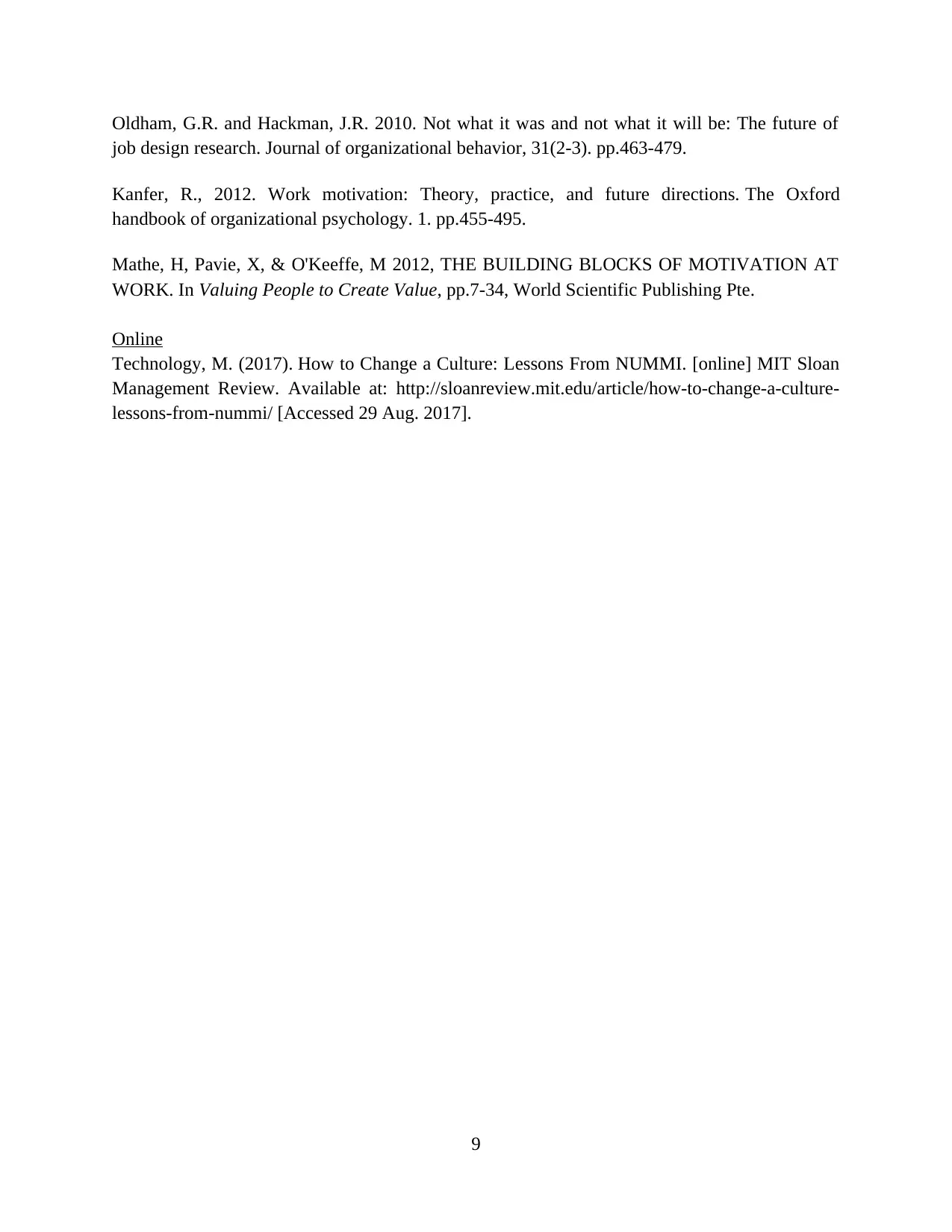
Oldham, G.R. and Hackman, J.R. 2010. Not what it was and not what it will be: The future of
job design research. Journal of organizational behavior, 31(2‐3). pp.463-479.
Kanfer, R., 2012. Work motivation: Theory, practice, and future directions. The Oxford
handbook of organizational psychology. 1. pp.455-495.
Mathe, H, Pavie, X, & O'Keeffe, M 2012, THE BUILDING BLOCKS OF MOTIVATION AT
WORK. In Valuing People to Create Value, pp.7-34, World Scientific Publishing Pte.
Online
Technology, M. (2017). How to Change a Culture: Lessons From NUMMI. [online] MIT Sloan
Management Review. Available at: http://sloanreview.mit.edu/article/how-to-change-a-culture-
lessons-from-nummi/ [Accessed 29 Aug. 2017].
9
job design research. Journal of organizational behavior, 31(2‐3). pp.463-479.
Kanfer, R., 2012. Work motivation: Theory, practice, and future directions. The Oxford
handbook of organizational psychology. 1. pp.455-495.
Mathe, H, Pavie, X, & O'Keeffe, M 2012, THE BUILDING BLOCKS OF MOTIVATION AT
WORK. In Valuing People to Create Value, pp.7-34, World Scientific Publishing Pte.
Online
Technology, M. (2017). How to Change a Culture: Lessons From NUMMI. [online] MIT Sloan
Management Review. Available at: http://sloanreview.mit.edu/article/how-to-change-a-culture-
lessons-from-nummi/ [Accessed 29 Aug. 2017].
9
⊘ This is a preview!⊘
Do you want full access?
Subscribe today to unlock all pages.

Trusted by 1+ million students worldwide
1 out of 9
Related Documents
Your All-in-One AI-Powered Toolkit for Academic Success.
+13062052269
info@desklib.com
Available 24*7 on WhatsApp / Email
![[object Object]](/_next/static/media/star-bottom.7253800d.svg)
Unlock your academic potential
Copyright © 2020–2026 A2Z Services. All Rights Reserved. Developed and managed by ZUCOL.





